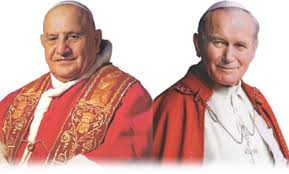 Few are the people who we can say that their lives had world changing effect. In the 20th Century two such men were Angelo Giuseppe Roncalli (1881-1963) and Karol Józef Wojtyła (1920-2005). You probably know them by their better remembered names of Pope John XXIII (served 1958-1963) and Pope John Paul II (served 1978-2005).
Few are the people who we can say that their lives had world changing effect. In the 20th Century two such men were Angelo Giuseppe Roncalli (1881-1963) and Karol Józef Wojtyła (1920-2005). You probably know them by their better remembered names of Pope John XXIII (served 1958-1963) and Pope John Paul II (served 1978-2005).
In 1962 Pope John XXIII called the Second Vatican Council of Roman Catholic leaders and bishops. That three year council made many sweeping changes to practices of the Roman Catholic Church (RCC) such as no longer requiring the mass to be done only in Latin. It also made a few, albeit superficial, changes to RCC doctrine.
John Paul II is best remembered for his courage and strength in challenging the Communist rulers of his homeland Poland. His powerful moral presence went a long way toward bringing down the Soviet Union and eliminating the Iron Curtain. His determination almost cost him his life in 1981 when he was shot by a Turkish gunman allegedly in the employ of the Bulgarian Communist Party.
This past week the Roman Catholic Church announced that those two men are now on a fast track to being canonized (officially recognized) as Saints of the RCC. Most non-Catholics however do not really understand what that means. According to Catholic theology a person may be canonized a “Saint” if they lived such an exemplary life that they have essentially reached a state of sinless perfection. Thus they are deemed qualified to go directly to heaven by-passing purgatory. Purgatory is that place, according to RCC doctrine, where everyone who is saved (i.e. baptized Catholic communicates) must go for a time (probably thousands of years) to be purged of their sins and purified before they can enter into God’s holy presence. Catholics even believe it is appropriate to pray to Saints because they are in such close relationship to God and Jesus.
But, we must ask, what does the Bible teach about this? First, there is nothing in Scripture about purgatory. The concept was added to Catholic theology long after the New Testament age. There is no need for a Christian to go there or anywhere else to be purged of sins. Jesus accomplished that task once and for all on the cross. Through faith, we have our sins purged and we are purified only by his grace and imputed righteousness.
Second, the biblical term translated “saint” is from the Greek hagios which means “holy ones.” Consistently in the New Testament that term is used in reference to all true believers in Christ, dead or alive, and not to a certain special class of extra-holy people (see Acts 9:13, 32, 41; Romans 1:7; 8:27; 12:13; 15:25-31; 16:2,15; et.al.). While we certainly agree that people who live dedicated lives for Christ or in service to mankind should be recognized and honored, we see no biblical basis for the Catholic concept of sainthood.
